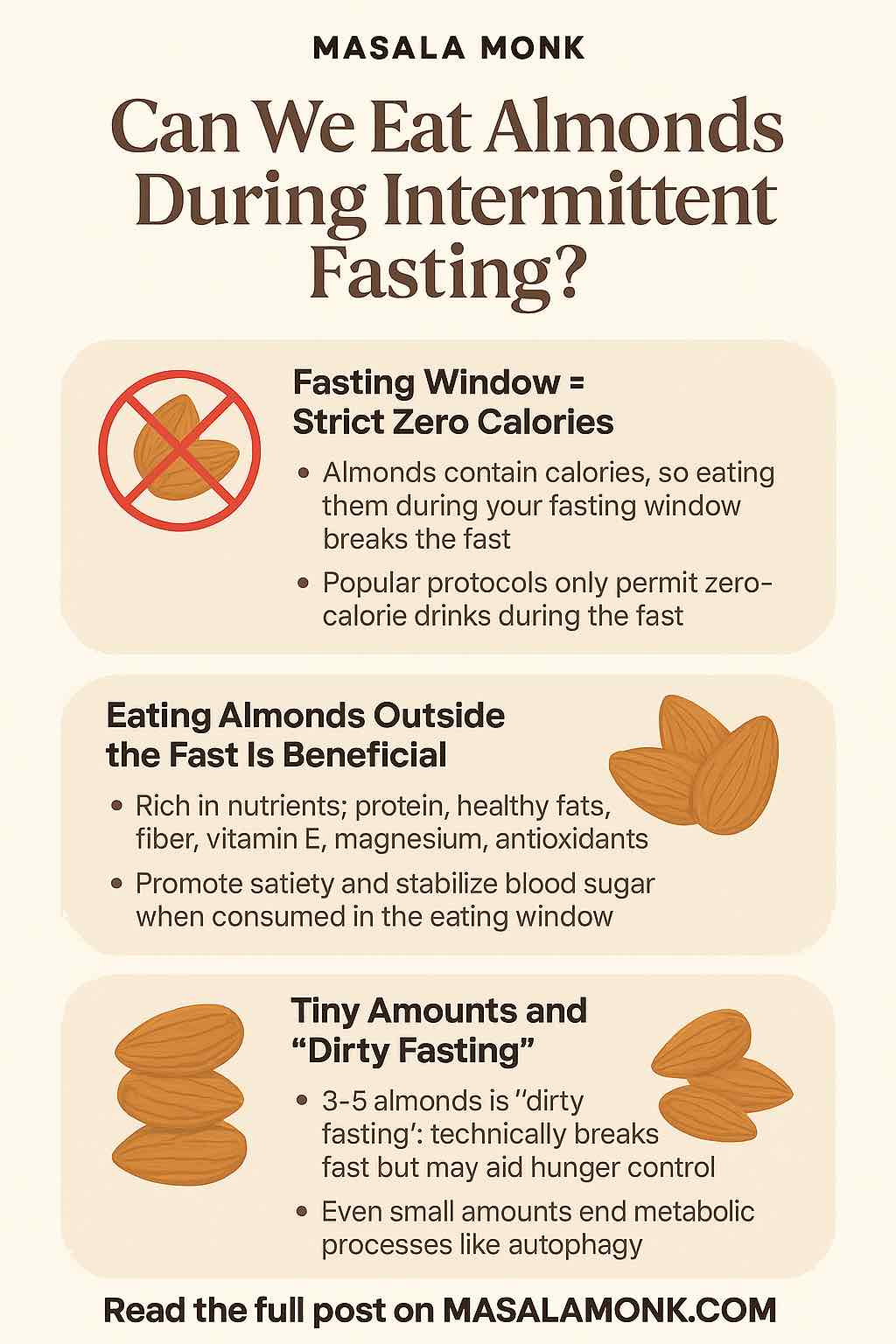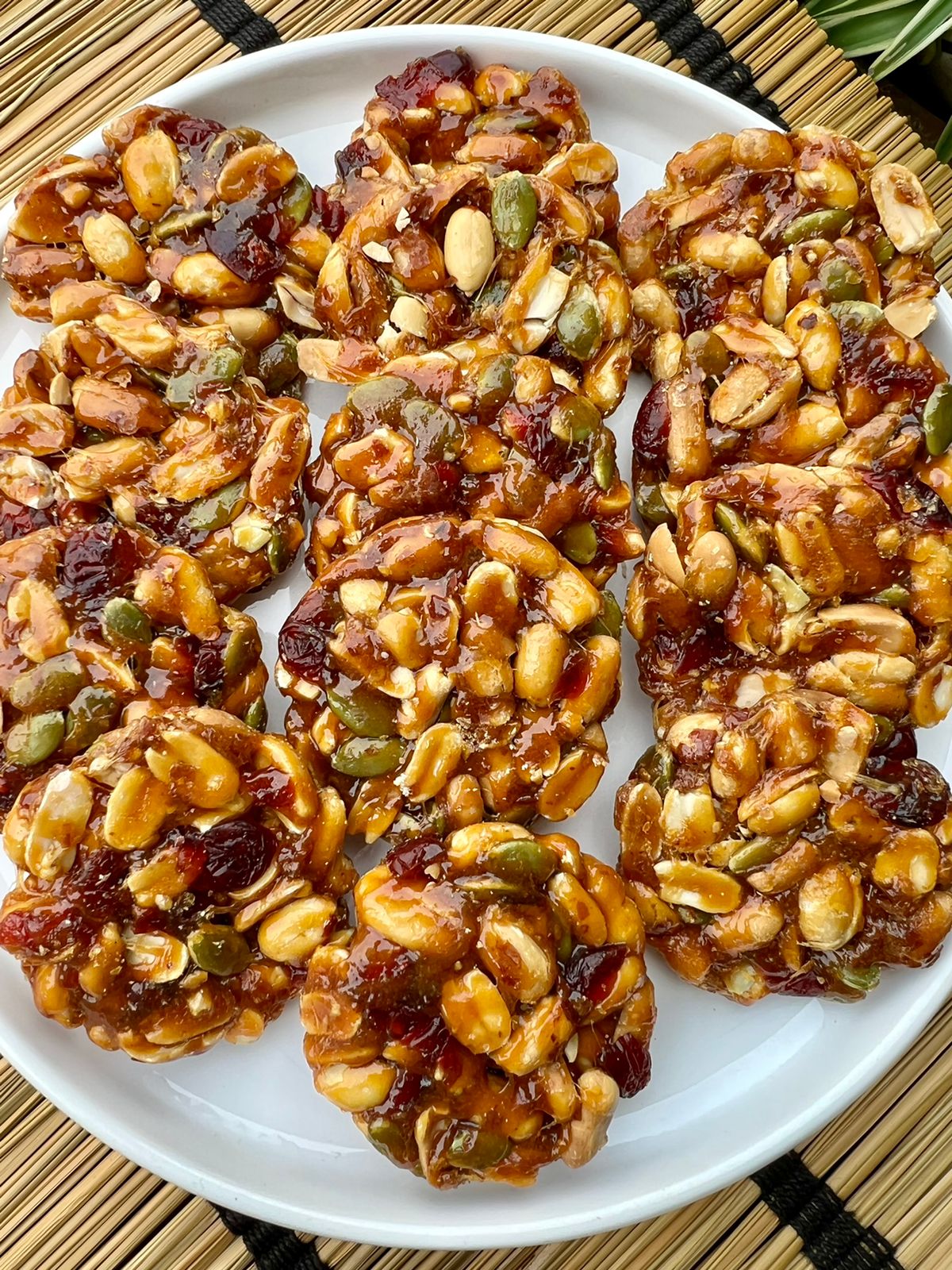
Intermittent fasting (IF) has surged in popularity as a highly effective approach for weight loss, metabolic health, and overall well-being. As with any dietary protocol, questions often arise around what can or cannot be consumed during the fasting window. One recurring query is: Can I eat almonds during intermittent fasting?
This comprehensive guide dives into the science, logic, and practical considerations behind this question. We’ll explore how almonds affect fasting, the differences between strict and flexible fasting approaches, and how you can use almonds strategically to support your health goals.
Understanding Intermittent Fasting Intermittent fasting is not about what you eat but when you eat. The most popular forms include:
- 16:8 (16 hours fasting, 8 hours eating)
- 5:2 (5 days normal eating, 2 days very low-calorie intake)
- OMAD (One Meal a Day)
The key premise: During the fasting window, you refrain from caloric intake to allow your body to enter a fat-burning, insulin-sensitive state. You can typically consume only water, black coffee, tea, or other zero-calorie beverages.
Nutritional Profile of Almonds Almonds are a superfood packed with nutrients:
- Calories: ~160 per ounce (about 23 almonds)
- Fat: 14g (mostly monounsaturated fats)
- Protein: 6g
- Carbohydrates: 6g (3.5g fiber)
- Rich in: Vitamin E, magnesium, calcium, antioxidants, and healthy fats
These attributes make almonds an excellent food choice during your eating window, but they also raise questions about consuming them during the fast.
Strict Fasting: Do Almonds Break a Fast? If you’re practicing strict intermittent fasting with goals like autophagy (cellular cleanup), improved insulin sensitivity, or metabolic regulation, the answer is simple:
Yes, almonds break your fast.
Any food containing calories, even small amounts, triggers a metabolic response:
- Increases insulin levels
- Interrupts autophagy
- Shifts your body out of the fasted state
Therefore, strict fasters should avoid almonds or any other caloric food during the fasting window.
Flexible Fasting: Is There Wiggle Room? Not all intermittent fasting approaches are rigid. Some people follow a more relaxed version, often referred to as “dirty fasting,” where minimal caloric intake is tolerated if it helps adherence or curbs hunger.
In such contexts, small portions of almonds (e.g., 5–10 nuts, ~40–80 calories) may be:
- Acceptable for weight loss if it prevents overeating later
- Low-impact on insulin if paired with fiber and healthy fats (as almonds naturally are)
- Not ideal for autophagy or glucose regulation goals
The key here is intent. If your primary goal is fat loss, and a few almonds help you stick to your plan, the net impact may still be positive.
Scientific Insight: Almonds and Metabolism Numerous studies support the benefits of almonds when consumed at the right time:
- Satiety: Almonds increase fullness, potentially reducing overall calorie intake
- Glycemic control: They stabilize blood sugar due to fiber and healthy fat content
- Heart health: Almonds support reduced LDL cholesterol and inflammation
- Weight management: Despite their calorie density, they’re not linked to weight gain when consumed in moderation
However, none of these benefits apply during the fast. The body must remain in a fasted state to unlock autophagy and hormone optimization.
When to Eat Almonds for Best Results Almonds shine during the eating window of your intermittent fasting cycle. Here are optimal ways to include them:
- As a break-fast food:
- Combine with fruit or Greek yogurt for a nutrient-rich post-fast meal
- Pre-workout snack (within eating window):
- A handful of almonds provides energy and protein
- Evening satiety booster:
- Add them to a salad or grain bowl to increase fullness
Summary Table: Almonds and Intermittent Fasting Goals
| Goal | Can You Eat Almonds During Fast? | Recommendation |
|---|---|---|
| Autophagy / Cellular repair | No | Avoid during fast |
| Weight loss | Technically no, but minor intake okay | Small quantity if it helps avoid overeating |
| Blood sugar management | No | Best consumed during eating window |
| Muscle maintenance / recovery | No | Include in post-fast meals |
Final Verdict Almonds are a powerhouse of nutrition, but they are not fasting-friendly during the strict no-calorie period. If your priority is cellular regeneration, ketosis, or insulin sensitivity, consuming almonds during the fast defeats the purpose.
However, if you’re using intermittent fasting primarily as a tool for weight control, and a few almonds help reduce hunger and support adherence, the overall impact may be minimal. The key is consistency and intentionality.
Takeaway
Stick to zero calories during your fasting window. Save almonds for your eating window to fully enjoy their health benefits without compromising your fasting goals.
🔍 FAQs: Almonds & Intermittent Fasting
- Do almonds break a fast?
Yes. Almonds contain calories, fats, and proteins, which trigger metabolic activity and break a fast. Even a small handful will shift your body out of the fasting state. - Can I eat almonds if I’m doing 16:8 intermittent fasting?
You can eat almonds during the 8-hour eating window, but not during the 16-hour fasting window. They’re a great nutrient-dense snack when consumed at the right time. - What happens if I accidentally eat a few almonds during a fast?
While it technically breaks your fast, one small slip won’t ruin your progress. Simply return to fasting and maintain consistency going forward. - Can almonds help with hunger during intermittent fasting?
Yes, but they should be used during the eating window. They promote satiety due to their healthy fat and fiber content, helping reduce overeating. - Are almonds okay during ‘dirty fasting’?
Dirty fasting allows minimal calorie intake. In that context, 3–5 almonds might be acceptable, especially for hunger control—but they still disrupt autophagy and insulin rest. - What’s the best time to eat almonds while intermittent fasting?
Right after breaking your fast or as part of a nutrient-dense snack or meal during the eating window. They’re especially useful in post-fast meals for satiety and nutrient balance. - Do soaked almonds have the same effect on fasting as raw almonds?
Yes. Soaked or raw, almonds contain calories and will break a fast. The soaking process doesn’t eliminate their macronutrient content. - Can almonds be eaten on a keto-style intermittent fasting plan?
Yes—during the eating window. Almonds are low in net carbs and high in healthy fats, making them ideal for low-carb/keto intermittent fasting combinations. - Are almond-based products like almond butter or almond milk allowed during fasting?
No. Unless explicitly unsweetened and calorie-free (most are not), almond-based products contain calories and should be avoided during the fasting period. - How many almonds should I eat during the eating window?
A healthy portion is about 1 ounce (23 almonds). For weight loss or calorie control, 10–15 almonds is a good snack size.










